Carol and I will soon head out on one of our trademark coast-to-coast adventures, if you count our home in suburban Washington, D.C., 200 kilometers (124 miles) from the Atlantic Ocean, as one of the “coasts.” The other end of the journey, in Port Angeles, Washington, just a short dash up the Strait of Juan de Fuca from the Pacific, will be as coastal as it gets.
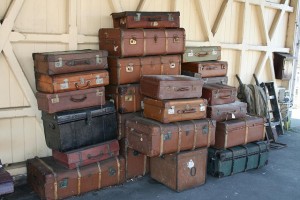
This looks like our traveling bags, all right, except that these are better organized. (Davesportfolio, Flickr Creative Commons)
I’ll be working like a sled dog on this trip — which I’ll tell you more about in September — driving a borrowed blimp of a car and serving as Carol’s “grip” for all 13 her hefty bags of lights, cameras, tripods, and “healthful” things that she eats. They include some kind of real milk — not beige-colored soy oil or extract of flax — that somehow stays fresh and unspoiled for weeks without refrigeration. A case of that stuff hefts like a steamer trunk.
I’m a little bummed about this journey, even though I look forward to the open road — a misnomer, since there ARE no open roads until you get to western Minnesota.
No, I’m bummed because Jeff Deck, a Boston blogger, editor, and occasional cartoonist, beat me to a great idea that he got on one of his own trips about the land.
He even got a book out of it.
Salon.com’s Thomas Rogers writes that “Deck decided to give his life some purpose” by riding around the United States looking for — and, where possible, fixing! — typos.
Not a higher calling like missionary work, but worthwhile.
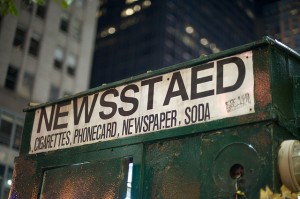
This “typo” has been around for a long time. You’d think erudite newspaper readers would have insisted upon a correction by now. (sirsnapsalot, Flickr Creative Commons)
Like me, Deck gets nettled and unsettled when he runs into misspelled words or glaring syntactical errors that are out in the open for all to see. For him, it started when he came upon a sign that read, “Private Property: No Tresspassing,” with an extra “s” in the “tres” part of the word.
He soon found that there are similar outrages everywhere, such as the sign for a supposedly educational software company that read, “So Fun, They Won’t Even Know Their Learning” — with the wrong spelling of “they’re” there.

Oh, oh! Duel exhaust. Could be explosive from all the gunfire! (ConanTheLibrarian, Flickr Creative Commons)
So Jeff and a friend, Benjamin Henson, decided to hit the road, tracking goofs and gaffes, cataloguing them, even CORRECTING them on the spot. That’s right — stepping out of the car and editing mistakes, right along the road. The book shows photographs of Jeff rearranging the letters of misspelled words on restaurant spaghetti-board signs.
Most aren’t gruesome errors, such as the items printed on menus by people for whom English is not a primary language. You’ve seen them on the Web: “chef’s kidneys,” “homely Indian-style buffalo wings,” and the like.
But the ones that Jeff went after, such as billboard ads that read, “Just between you and I” are worse, because they were written by lifelong, English-speaking Americans who should know better.
Despite Jeff’s book title, The Great Typo Hunt, these really aren’t “typos.” No linotype stuck in an errant apostrophe or spit out the word “over” where “more than” is better form. These are mistakes born of human ignorance, indifference, or bad teaching — imperfections that riled Deck and Henson enough that they launched a search-and-destroy mission to find and fix a bunch of them.
Does that make them — and me — what msnbc.com’s Diane Mapes describes as “fastidious spelling snobs pushed over the edge.” Or “pretentious,” as one blog reader commented.
Or are we word warriors, battling for truth, grammatical justice, and the correct spelling of “Milwaukee” in all public places?
A lot of people know that “its” needs an apostrophe when the word means “it is” — and doesn’t call for one when it’s being used in its possessive form — but they dismiss such errors on business signs, neighborhood circulars, and the like as trifles, syntactical bagatelles. (I just had to write “syntactical” again and to become the first person ever to combine it with “bagatelles.”)
There are, for sure, matters of greater gravity, such as the search for world peace. But come on! It’s easier and more fun to look for signs that read, “Please Hang You’re Towels on the Wrack”? Or — my pet peeve — welcome mats that read, “The Smith’s.” (If you don’t see anything wrong with those sentences, see me after class.)
Jeff Deck told Slate that “typos cloud communication, which is the primary purpose of writing.”
When I taught journalism or, as a radio news director, scanned applicants’ resumes — note that it’s “applicants’,” with the apostrophe after the s in this plural form — I put a different spin on it. When I come upon careless and plain dumb mistakes, I assume the person writing them is also intellectually slovenly. If a person won’t or can’t get the little things correct, how can he or she be trusted to get big things right?
We are not alone, Deck, Henson, and I. Mapes at msnbc.com reports that “[t]he 350,000-member Facebook group ‘I Judge You When You Use Poor Grammar’ encourages its members to ‘seek out the infidels (grammar offenders) and . . . document their acts of terror. Take pictures and post them in this group to serve as examples to all.’”
350,000 fellow word warriors are on the march!
Do you hear that, lazy spellers in Utica, New York? On guard, grammar gougers in Bismarck, North Dakota. Lie low, you who would write “lay low” in Port Angeles, Washington! I’m coming your way. And I’m bringing a photographer.
****
Sweet Visit, Alabama
That photographer — Carol — is not off shooting America for the fun of it. Or to get rich.

Carol spent six months’ work of weekends, shooting the Library of Congress’s glorious Jefferson Building. Her images abound in the visual presentations within the Library’s new, interactive visitor kiosks. (Carol M. Highsmith)
She is six months into what will be a 16-year adventure — and she’s already 64! — visually documenting each and every state in a “21st Century America” project for the Library of Congress. Thousands of her images of our nation in the early years of this new century — and new millennium — will be added to the Carol M. Highsmith Archive at the world’s largest repository of human thought and creativity. I am proud to note that this place, revered as “America’s Memory,” lists Carol’s as one of six featured collections on its prints-and-photographs Web portal page, alongside the likes of Civil War master photographer Mathew Brady.
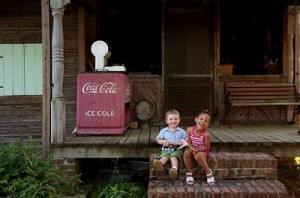
What better representation of the “New South” — yet with very much the feel of the old one, could there be? (Carol M. Highsmith)
Carol began “21st Century America” in Alabama, which only coincidentally is also the first state alphabetically. To the right, you see just one of her photographs from that state that calls itself “The Heart of Dixie.” It was taken in front of one of the old, mostly abandoned buildings on the grounds of a Walker County antiques collector who had come upon a century-old camera belonging to Carol’s beau ideal. Her name was Frances Benjamin Johnston, a pioneer female photographer who captured southern scenes in the years before and after the turn of the 20th Century. As Carol is doing, Johnston donated her life’s work, copyright-free, to the Library of Congress.
To me, the photo of the two charming children recalls the warm look and feel of the 1941 photo of a Greene County, Georgia, family, riding down the road in a buggy, that you see to the left. They depict the “disappearing America” about which I’ve often written, preserved for future generations to study and admire, if only as a magical visual record.
You can see many of Carol’s initial 21st Century America photographs from Alabama, in categories such as “Life,” “Civil War,” and “Way Out There,” on a wholly noncommercial site: http://www.21stcenturyalabama.com/
Ted's Wild Words
These are a few words from this posting that you may not know. Each time, I'll tell you a little about them and also place them into a cumulative archive of "Ted's Wild Words" in the right-hand column of the home page. Just click on it there, and if there's another word that you'd like me to explain, just ask!
Bagatelle. A small, unimportant thing or trifle. The name comes from the French, from the word for a short, lighthearted piece of music.
Beau ideal. A hero or heroine after whom one strives to model his or her life.
Linotype. A machine, now rather old-fashioned, that produces solid lines of type in lead — with the letters in backward order. These lines are braced in a printing press, inked, and applied to paper, where the letters appear in the correct order.
Misnomer. An incorrect or improper name given to something.


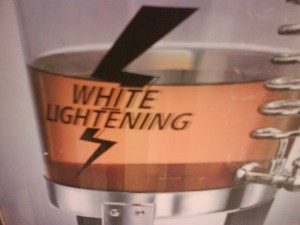
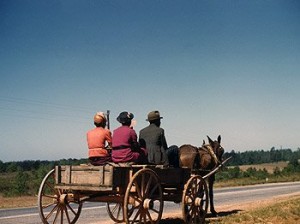

6 responses to “Roadies”
The younger generation does not have a lot of regards for grammar. Question is can grammar be changed ?
Hey, maybe the mat just belonged to the local ironworker and they stole it.
They sell the sterilized(?) milk in Europe almost exclusively! Think of all the electricity a country could save by not having to refrigerate milk. What’s wrong with the Midas billboard? They are trying to sell duel exhaust conversions..
OUCH! Today I learned about ‘dual’ exhaust 😉
Scho’s comment should read: “regard for grammar.”
I really don’t accept as true with this particular article. Nevertheless, I had researched with Yahoo and I have found out that you are right and I seemed to be thinking in the wrong way. Carry on writing quality content like this.